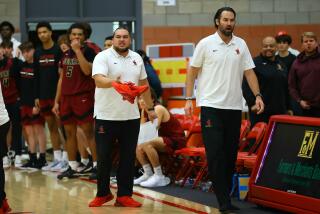Coach Agrees He Broke Rule, but Questions His Punishment
DANA POINT — At 3:02 on a December afternoon, Rich Skelton was sitting in the social science department office at Dana Hills High School. He was a little uneasy and a bit pensive as he spoke.
For the first time in 26 years, Skelton was not conducting a basketball practice on a December afternoon.
Skelton was suspended for one year by Capistrano Unified School District officials in June because he had contact with a parent before his son, a basketball player, was enrolled at Dana Hills, which is a violation of Southern Section rule 510 regarding undue influence.
Skelton also allowed the player to live at his house during a three-week period, from late September to mid-October. Although that alone is not a violation, the question was raised by the Southern Section as to when Skelton agreed to house the student.
Skelton admits breaking the rule, although he said he was unaware that he had done so at the time. It’s the punishment that he doesn’t agree with.
“When the rule was spelled out to me, I said, ‘Yes, I broke it,’ ” said Skelton, who has coached at Dana Hills for one season. “But I didn’t break the intent of the rule. In this sense, the punishment doesn’t fit the crime.”
The case is unique because it was the parent of the player who turned Skelton in and later testified against him in a session with Southern Section officials.
Tony Vivona, whose son played for Dana Hills last season, contacted Southern Section officials last season after he discovered that Skelton had violated the rule. Why he did it is open to debate.
Skelton said Vivona was angry because his son, John, did not receive enough playing time. Skelton also said Tony Vivona threatened to turn him in if his son did not play more.
“I told him that as far as I knew, I was within Southern Section rules,” said Skelton, who is a history teacher at Dana Hills. “I also told him he was more than welcome to check with the Southern Section.”
Vivona’s version differs. He said he called Southern Section officials after friends told him Skelton might have violated rules by housing his son.
But Vivona learned of the violation when he talked with Skelton in August, before his son’s enrollment at Dana Hills.
Vivona said he told Skelton in January that he was going to the Southern Section, but he didn’t use it as a threat. Vivona also said that had his son received more playing time, he would not have filed a complaint.
“Sure, I would have let it go,” said Vivona, who has moved back to Texas. “But he played less. I felt it was a disservice to my son. His whole life was crumbling.”
In April 1988, Vivona moved to California from Woodlands, a suburb of Houston. He had been contracted to work as an engineer for a company in Mission Viejo.
Vivona rented a room in Dana Point and, during the summer, decided he would move his family to California. Because his son was a basketball player, he contacted Skelton.
“The first question I asked him was, ‘Where do you live?’ ” Skelton said. “He told me the address, which was within the Dana Hills attendance area.”
If Skelton had then referred Vivona to a Dana Hills administrator, there would have been no violation.
“It wasn’t like the kid was coming from a school in the area,” Skelton said. “I don’t like talking to kids from another coach’s program.”
But because Vivona was from Texas and was living within the Dana Hills’ boundary, Skelton said he didn’t believe there was anything wrong with talking to Vivona. They had between five and 10 conversations before school started, according to Skelton.
“He said his son was an outstanding basketball player,” Skelton said. “I had this little thought in my mind that maybe we were going to get a good transfer here.”
Shortly after school began, John Vivona moved into Skelton’s house.
Tony Vivona’s wife and family was still living in Woodlands at the time. John came to live with his father in late August.
“Skelton kept bugging me to get my son out here,” Vivona said. “But I hadn’t found a place for my family to live. I was still staying in a room in Laguna Niguel. He said he would let John live with him.”
Skelton said he only agreed to let Vivona’s son move in after he had enrolled at Dana Hills. And he did so only because John Vivona had no place to sleep.
“The kid was carrying a heavy academic load,” Skelton said. “He didn’t have a place to study and was sleeping on the floor. The father told me they were going to get a place over the weekend, so I said the kid could come stay at my house.”
Vivona stayed three weeks, Skelton said.
“It was an inconvenience, but I wanted to help the kid,” Skelton said. “The father even brought his dog over one night and wanted to know if I knew of a place he could keep it. We called a few places, but we couldn’t find a place. So I told him he could keep it at my house for a couple of days. The dog barked the whole time.”
Skelton said it was apparent from the beginning that Vivona had exaggerated about his son’s abilities.
“I could tell from the first couple of days of practice that he wasn’t going to be an impact player,” said Skelton, who has been a head coach at Workman, San Clemente and Grand Island (Neb.) high schools and was an assistant at Saddleback College before coming to Dana Hills.
John Vivona, who is 6-feet-6, was a starter for the sophomore team at McCullough High in Woodlands. However, he couldn’t crack the starting lineup at Dana Hills and became a seldom-used reserve.
“He was the second-tallest player on the team and should have had more playing time,” Vivona said. “I think someone who is tall has the capability of doing a little more in basketball than someone who is shorter.”
This season, John Vivona is again playing for McCullough. Terry Priest, the team’s coach, said Vivona plays about five minutes a game and is averaging fewer than two points.
“He has a difficult time playing for us,” Priest said. “He’s very slow and he doesn’t jump well. He has improved since he was here as a sophomore, but his reactions are not what they need to be in order to become a good player.”
After the 1988-89 season, Dana Hills officials received word that the Southern Section was investigating Skelton. According to Skelton, a “fact-finding” hearing was held, during which Southern Section officials produced a letter written by Tony Vivona.
“The purpose of the letter was to show there was undue influence,” Skelton said. “It was filled with truths, half-truths and things that were entirely false.
“The whole gist was to show that it was my intent to recruit this boy and keep him from going somewhere else. My feeling was, I found out right away that the kid couldn’t play and I still helped him. To me, it was the right thing to do.”
John Smart, Dana Hills principal, said he first was going to only reprimand Skelton. However, Southern Section officials said that was not enough.
“They wanted to be consistent with previous cases,” Smart said. “I have a high opinion of Rich. I’ve known him for 15 years and I know he wasn’t trying to circumvent the rules.
“The father wasn’t doing this out of some moral principle. If Rich would have played his son, he wouldn’t have gone to the Southern Section.”
And Skelton would be leading a basketball practice now. Still, life without basketball hasn’t been so bad.
Skelton is taking classes to learn more about the real estate business and has devoted time to such hobbies as fishing and hunting. He even has trained two hunting dogs, which he said is a lot like coaching basketball players.
“They (the dogs) have the instincts, but you have to teach them,” Skelton said.
And, of course, there is more time to be with his family.
The free time Skelton has to spend with his daughter and son has allowed his wife to go back to school. Sharon Skelton is working on a master’s degree in psychology.
But even with all that, there is a void. After 25 years in the business, 12 of which have been spent as a head coach, Skelton misses basketball.
“Certainly there are some things I don’t miss,” he said. “There are a lot of problems that come with being a coach. But I do miss being on the floor with the players. It’s the best part about coaching.”
More to Read
Sign up for Essential California
The most important California stories and recommendations in your inbox every morning.
You may occasionally receive promotional content from the Los Angeles Times.











